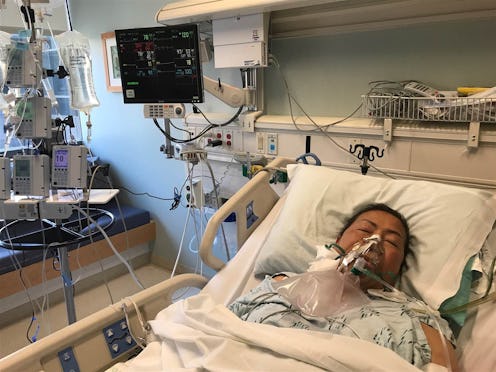News
The U.S. Won’t Grant A Visa To This Cancer Patient’s Life-Saving Stem Cell Donor
Two Vietnamese American woman are in a race to save their dying mother from cancer, but the U.S. immigration process has put up a significant hurdle. Helen Huynh, a 61-year-old Southern California woman, has been battling an aggressive form of leukemia since February. Doctors say a stem cell transplant from Huynh's youngest sister in Vietnam could give her two to five years to live, said Huynh’s daughter Yvonne Aivan Murray to NBC. Unfortunately, immigration officials denied a U.S. visa to the Vietnamese stem cell donor. In total, the U.S. government has rejected Thuy Nguyen's application for a visa three times already, according to Murray.
Huynh currently lies in the the intensive care unit at UCI Medical Center where she is on morphine for pain and comes in and out of consciousness. Doctors said finding a stem cell donor who was at least a 70-percent match would be a slim chance, but in June, Huynh's family found a 100-percent match with Nguyen. She would need to travel to California for her sister's cancer treatment, but the United States barred her entry for the stem cell donation despite three hospitals sending letters stating it was a medical emergency, according to Huynh's other daughter Sharon Adams.
Murray told ABC 7, "If we were an Italian-American or a Scottish-American, then our family member could just come on the plane and come here anytime."
Nguyen went to the U.S. Embassy in Ho Chi Minh City for her visa interviews, but the consulate denied her requests on the grounds that she did not have enough reasons to "compel her to depart the United States at the end of her temporary stay," according to a letter dated Aug. 11. Nguyen listed her 5-year-old daughter, property, and money in Vietnam as reasons she would return.
“The interviews were probably three minutes. They’re not even looking at the supporting documents or looking at our situation,” Adams told ABC7.
The U.S. Consulate in Ho Chi Minh City and the State Department have not made any public comments on the case.
Huynh's daughters suspect the fact that their aunt lives in Vietnam is the main reason why she's been denied admission. As Murray pointed out, their aunt would be able to enter the country without such problems if she came from a country like Italy or Scotland. It's not about race, but U.S. policy with less developed countries is a flaw in the visa process that needs to change, she said. The family said they have since hired an immigration attorney to help with an application for humanitarian parole. If accepted, U.S. Citizenship and Immigration Services would allow Nguyen admission into the country for "humanitarian reasons." Rep. Alan Lowenthal (D-CA), who represents the city Huynh lives in, also tweeted he's working with the Department of State and Department of Homeland Security to bring Nguyen to her sister as soon as possible.
The government invited Helen Huynh and her family to move to the United States in 1991 because Vien, Helen's husband of 35 years, fought alongside the U.S. Army in the Vietnam War. Huynh has three daughters, including youngest daughter Tiffany who has Down syndrome and three grandchildren. When the family arrived in Garden Grove, California, Vien said he delivered pizzas and newspapers, and ironed shirts for $0.15 each while his wife collected recyclables. The family gained U.S. citizenship five years later.
Before her hospitalization for aggressive leukemia, Helen Huynh was the main caretaker of Tiffany. Tiffany's sisters are now in charge of taking care of Tiffany and have started a GoFundMe to aid with their mother's medical expenses, taking time off work to care for Helen and Tiffany, and the funeral arrangement.
This is not the first time the U.S. Embassy & Consulate in Vietnam has gotten publicity in the last couple of months. In August, the consulate reversed their decision and granted a temporary visa to a woman in Vietnam who wanted to visit her dying daughter in San Jose. The Californian was diagnosed with terminal lung cancer and her final wish was to be reunited with her mother. According to the family, immigration officials initially denied the visa out of fear the mother would stay in the United States permanently.
